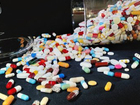Women treated with radiation for breast cancer are more likely to develop heart problems later, even with the lower doses used today, new research suggests. The risk comes from any amount of radiation, starts five years after treatment and lasts for decades, doctors in the UK found.
Patients shouldn't panic — radiation has improved cancer survival, and that is the top priority, doctors say. The chance of suffering a radiation-induced heart problem is fairly small.
 Full Story
Full Story
A woman who was given a new liver, pancreas, stomach and small and large intestine at a Miami hospital in 2007 has delivered a healthy baby girl, believed to be the first known case of a five-organ transplant patient giving birth.
Fatema Al Ansari, 26, said Wednesday she was overjoyed after giving birth by cesarean section Feb. 26. She held the sleeping child at a gathering with reporters Wednesday at the same hospital, Jackson Memorial, where she had transplant surgery in 2007.
 Full Story
Full Story
A "SARS-like" virus that has sparked a health alert by killing nine of the 15 people known to have contracted it infects the body via a docking point in lung cells, a study said Wednesday.
Tests on lab cells have highlighted a key entry point for the new virus and suggest bats may be a natural reservoir for it, investigators said.
 Full Story
Full Story
Ninety-one percent of people living in Asia have improved access to clean water, a remarkable achievement over the last two decades in the world's most populous region. But its richest countries and wealthiest citizens likely have better water supplies and governments better prepared for natural disasters.
The assessments made by the Asian Development Bank in a study published Wednesday say countries in the region could be disproportionally affected by the potential impact of climate change if they did not rethink how they manage their water resources. Nearly half of the deaths caused by water-related disasters and 90 percent of people affected by such disasters from 1980 to 2006 lived in Asia, the report said.
 Full Story
Full Story
Lebanese neurologist Lara Jehi has found, in a research study in the U.S., a solution for the youngest epilepsy patients for whom medication doesn't work, assuring that frontal lobe surgery can stop seizures -- in many cases forever.
"We have a chance with this surgery to really give people their life back," said Jehi, lead study author and director of the Cleveland Clinic Epilepsy Center, where about 100 pediatric surgeries are performed each year.
 Full Story
Full Story
Gains in life expectancy across Europe could be reversed if cash-strapped governments cut health budgets, the World Health Organisation warned in a report on Wednesday.
The WHO's European Health Report 2012 said that while Europeans are living longer, healthier lives -- with the average person now living until they are 76 -- the improvements could backslide if states slash investment in health as a result of the economic downturn.
 Full Story
Full Story
Quitting smoking sharply reduces the risk of heart disease -- even if kicking the habit comes along with a few extra pounds, according to a long-term study out Tuesday.
It's no secret that those living in the throes of nicotine withdrawal can pack on extra padding in compensation. Likewise, extra weight has been linked to extra risk of heart disease.
 Full Story
Full Story
Technology capable of diagnosing Alzheimer's disease long before its symptoms appear won a coveted honor for innovation Tuesday at the South by Southwest (SXSW) festival.
Neurotrack, which uses eye tracking to achieve a claimed 100 percent success rate, clinched the health technologies category in the SXSW Accelerator competition as the festival's interactive segment drew to a close.
 Full Story
Full Story
Interpol on Tuesday announced a deal with the world's top pharmaceutical companies to fight fake drugs which threaten the health of millions, especially in poor countries.
Twenty-nine leading companies have pledged 4.5 million euros ($5.9 million) over three years to improve the fight against the counterfeit industry, boost public awareness and crack down on illegal manufacturers.
 Full Story
Full Story
Sleeping a mere five hours a night during a workweek with unlimited access to snacks isn't good for your waistline, according to findings released Monday.
The study, led by the University of Colorado at Boulder, found that participants gained nearly two pounds (about 1 kilogram) when put in such a situation.
 Full Story
Full Story



